October 23, 2012
Edited by David Sanders
Specimen Days
October 23, 2012
1844 — Robert S. Bridges, England, poet laureate (d. 1930), is born.
1872 — Theophile Gautier, French poet/writer/historian/critic, dies at 61.
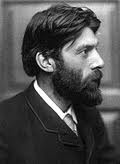 Triolet
Triolet
When first we met, we did not guess
That Love would prove so hard a master;
Of more than common friendliness
When first we met we did not guess.
Who could foretell the sore distress,
This irretrievable disaster,
When first we met?—We did not guess
That Love would prove so hard a master.
—Robert Bridges (1876)
Poetry In The News
Poems for Survival
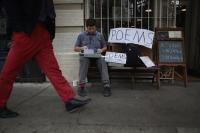
A recent Friday, 12:28 p.m.: Well after downing a cup of coffee, Zach Houston can’t peck out the next line of a new poem fast enough on his 1967 “glow-in-the-dark-green” Hermes typewriter. The caffeine amplifies a thought process that is already frenetic. Writer’s block has never been an issue for Houston, who says he finds inspiration in just about everything. Read more at SF Gate.
Poetry Book Will Be Released With QR Codes
When poet Eloise Klein Healy‘s new book A Wild Surmise: New & Selected Poems & Recordings comes out in 2013, it will come with bonus audio files of her reading her work. But instead of these recordings coming with a CD or DVD, readers can access them with a QR code. Read more at Media Bistro.
John Hawkes Praised for Role as Paralyzed Poet
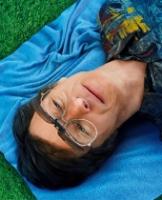
John Hawkes is generating a flood of praise and Oscar buzz for his performance in The Sessions, in which he plays the poet Mark O’Brien, who was left paralyzed from the neck down by childhood polio and spent much of his life in an iron lung. Awards are nice and all. But the viewers Hawkes cares about most are not the ones judging him just on artistic merit. They’re the people who knew and loved O’Brien, who died in 1999 at 49. Read more at the Boston Globe.
World Poetry
The Poet and His Stanza On the Call to Poetry
An elderly woman, trudging slowly up and down the dilapidated stairwell of a once-magnificent mansion, is the only remaining obstacle to the creation of this city’s newest literary museum. If the friends and admirers of the dissident poet Joseph Brodsky can find a way to buy the small space she still rents in what was once a communal flat within the palatial building, they hope to open a museum that will honor the writer who was forced out of the Soviet Union in 1972 and died in 1996 in New York City. Read more at the Washington Post.
Request for Dig to Find Poet’s Remains Denied in Granada

A Granada court has denied a request to excavate a site in nearby Alfacar that is believed to be the final resting place of the poet Federico Garcia Lorca. The exact location of the poet in an unmarked grave has been the subject of controversy ever since Lorca was executed during the first months of the Spanish Civil War. Read more at The Olive Press.
New Books
The Almanac: Poems by Steve Straight
[Paperback] Curbstone Books, 92 pp., $16.95
While the poems in Steve Straight’s new collection lead the reader “into the dark forest of memory / or onto the carnival ride of hypothesis, / or even right off the cliff of surprise,” they maintain a sure course through the din and distraction of modern life. Bits of news from the natural sciences, chance encounters, and even the convicted felon and crafting queen Martha Stewart all fall under Straight’s observant eye. The result is a collection of conversational poems that lend a sense of wonder to the commonplace. Billy Collins, former poet laureate of the United States, says, “Every one of the poems in The Almanac achieves that rare thing in the streets of contemporary poetry: they are just plain interesting.”
Bender: New and Selected Poems by Dean Young

[Hardcover] Copper Canyon Press, 300 pp., $26.00
Bender gathers a generous selection of new work along with treasure from Dean Young’s twelve volumes. Strongly influenced by Surrealism, Dean Young’s poems flash with extravagant imagery, humorous speech, sly views of the quotidian, and the exposed nerves of heartache. As the American Academy of Arts and Letters raved, “Young’s poems are as entertaining as a three-ring circus and as imaginative as a canvas by Hieronymus Bosch. He is one of the most inventive and satisfying poets writing today.”
Green Is for World by Juliana Leslie
[Paperback] Coffee House Press, 74 pp., $16.00
Peering through a macro lens at the shapes and voices of our universe, this collection captures the invisible and inexpressible elements of our world’s ruins and history while offering a “craving [for] details from the future.”
Writers Writing Dying: Poems by C. K. Williams
[Hardcover] Farrar, Straus and Giroux, 80 pp., $24.00
Since his first poetry collection, Lies, C. K. Williams has nurtured an incomparable reputation—as a deeply moral poet, a writer of profound emotion, and a teller of compelling stories. In Writers Writing Dying, he retains the essential parts of his poetic identity—his candor, the drama of his verses, the social conscience of his themes—while slyly reinventing himself, re-casting his voice, and in many poems examining the personal—sexual desire, the hubris of youth, the looming specter of death—more bluntly and bravely than ever.
Recent Reviews
“Because London is Still a Kaleidoscope”: The City’s History in Verse
by Katy Evans-Bush
This past summer— the summer of the 2012 Olympics — has been “London’s greatest moment”! So anyone riding on a bus in London was told by the recorded voice of the city’s mayor, Boris Johnson — though he turned out to be talking about how best to avoid the crush on public transport. By the same token, a rather over-excited official earlier this year appealed to Londoners, saying this Olympics was going to be the city’s “one chance to make a good impression”; and on the morning of the day of the opening ceremony, Big Ben rang outside its normal schedule for the first time since the funeral day of the last King in 1952. Read more at the LA Review of Books.
Looking in the Fridge and Finding Some Poetry
by Dwight Gardner
“Take away this pudding,” Winston Churchill reportedly said. “It has no theme.” I can understand Churchill’s hilarious pique. It’s how I often feel about poetry and about food writing. Both can be thin and flavorless. Both can be puddings without themes. Combine dining and verse, as has been done in a new anthology called The Hungry Ear: Poems of Food & Drink, and you have the potential for a perfect storm of muckiness. Read more at the New York Times.
All Messed Up
by G.M. Palmer
Shot full of suicides, clichés, and sex, Matthew Dickman’s Mayakovsky’s Revolver is a collection of poems not unlike A Confederacy of Dunces—a mediocre work made important by personal tragedy. In Dickman’s case, as evidenced by the back cover, the suicide of his older brother. While there is no reason to wish Mr. Dickman or his family anything but sympathies regarding their loss, one does not get a pass for poor literature because of tragic circumstances surrounding its creation. Read more at Contemporary Poetry Review.
Correspondences
Arts Lust: Naomi Replansky Gets Her Due — A Powerful NY-LA Poet Is Rediscovered
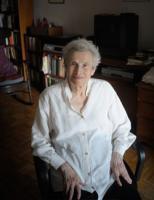
by Allan M. Jalon
Last May, as part of his concluding talk as poet laureate of the United States, Philip Levine praised the “remarkable” power of a little-known poet he read in his youth named Naomi Replansky. He described echoes he heard in her of Blake and Cesar Vallejo, argued she was unique in her era for how well she wielded “the lessons of the best surrealist poets” and called her a “warrior for justice.” Read more at the Huffington Post.
Both Israeli and Arab, a Poet Straddles a Conflict
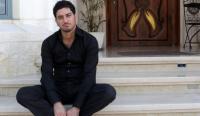
by Eli Eliyahu
Our interview has barely begun when Marwan Makhoul says to me, “It’s not easy for me to be interviewed by an Israeli newspaper. We, the Palestinian residents of Israel, are threatened by both sides, the Arab and the Israeli. We’re neither here nor there. We haven’t found a fitting definition for ourselves.” Read more at Haaretz.
Ten Questions (plus one) for Poet Nick Flynn
by Laurie Hertzel
Nick Flynn’s memoir, “Another Bullshit Night in Suck City,” was a brutal, moving account of working in a homeless shelter, where he is reunited with his estranged father. The book won a PEN Award and was translated into 13 languages. (It also gave newspaper book editors a headache, because its title could not be printed in most papers.) Here, via e-mail, he talks about where he writes, the unusual project he’s currently working on, and his views of the Motion Picture Association of America. Read more at the Star Tribune.
Broadsides
From “Four Voices: poems by Fernando Pessoa and his ‘heteronyms’”
by Andrew McCulloch
“[He] never did find out for sure who he was, but thanks to his doubts we can manage to learn a little more about who it is we are”, wrote the Nobel laureate for 1998 José Saramago about his countryman Fernando Pessoa. Pessoa, born in Lisbon in 1888, shared the Modernists’ view of the self as a shifting mosaic of contradictory impulses and devised a series of what he called “heteronyms” to separate and dramatize them. Read more at TLS.
Rediscovering Robinson Jeffers: the Poet’s Formative Years in L.A.
by Nathan Masters
As a city that hosted such masters of the novel as Faulkner and Fitzgerald, provided sanctuary to European titans like Mann and Brecht, and produced its own homegrown stars like Raymond Chandler and Bret Easton Ellis, Los Angeles is no stranger to literary greatness. But the poet who — according to at least one authority — is among the greatest to emerge from the city too infrequently enters into discussions of L.A.’s literary legacy. Read more at KCET.
Will the Real Walt Whitman Please Stand Up? Touching Perfect Bodies with his Mind

by Amy King
I cannot fathom that Walt Whitman was the first to write on a variety of controversies typically attributed to “Song of Myself,” including the complexities of slavery, the overt hand of eroticism, and the soul beyond the confines of religion, atrocities of war, etc. In fact, a number of writers come easily to mind who preceded him on such matters (i.e. William Blake, Phillis Wheatley, Ralph Waldo Emerson, Edgar Allen Poe). Read more at Amy King.
Quick Reciprocations: The Real Rhythms of Poetry
by James Aitchison
Poets and critics attribute to rhythm powers that it cannot possibly have. Ezra Pound, in ‘Credo’ (1917) in Modern Poets On Modern Poetry (1965) edited by James Scully, states: Rhythm. — I believe in ‘absolute rhythm’, a rhythm, that is, in poetry which corresponds exactly to the emotion or shade of emotion to be expressed. Rhythm can express emotion to a limited extent: the rhythm of an elegy, for example, is usually slower than that of a joyful lyric, but rhythm cannot express exact shades of emotion. Read more at Agenda Poetry.
Drafts & Fragments
Subway Poetry

Jack Cheng takes pictures of ads in subway stations and turns the words into poetry. He calls it Subway Cento.
Sailing to Byzantium: 13 Songs Based on the Poetry of W. B. Yeats
by Maria Popova
The intersection of music and literature is an enchanting place — from Tin Hat’s 17 songs based on the poetry of e. e. cummings to Emily Dickinson’s poetry set to song by Israeli singer-songwriter Efrat Ben Zur to Natalie Merchant’s soulful musical adaptations of Victorian children’s poetry, and even my ongoing Literary Jukebox side project. Now comes Sailing to Byzantium (iTunes) by jazz vocalist and composer Christine Tobin, a collection of thirteen songs — some soothing, some disquieting, some cinematic, all spellbindingly soulful — based on the poetry of W. B. Yeats. Read more at Brain Pickings.
Envoi: Editor’s Notes
Introduction: The Poetry of Thomas Hardy (A Special Issue)

by Gregory Dowling
Thomas Hardy is still far better known as a novelist than he is as a poet. Although certain poems have lodged themselves where, as Frost put it, they will be hard to get rid of, there is still a widespread conviction that much of his poetry is either awkward, difficult or just downright bad. And this despite such influential voices as Philip Larkin, who declared that he “would not wish Hardy’s Collected Poems a single page shorter,” and that he regarded it “as many times over the best body poetic work this century so far has to show” (said in 1966). Read more at Contemporary Poetry Review.
Well, it seems there was a bit of a dust-up over G.M. Palmer’s review of wunderkind Matthew Dickman’s new book, Mayakovsky’s Revolver (see above, under Recent Reviews), in the latest issue of the on-line journal, Contemporary Poetry Review. G. M. Palmer apparently doesn’t subscribe to the Thumper the Rabbit school of reviewing, which has some folks crying “foul.” But you can read it for yourself and decide. As I went to read it for myself, I also noticed, happily, that the CPR had dedicated its current issue to Thomas Hardy, specifically the results of the West Chester seminar held last June to study his poetry. The round-up by Gregory Dowling of the proceedings and Dowling’s own treatment of Hardy’s “The Last Signal” are worth the read if you enjoy insightful textual reading, which I do. So, if you go to CPR for the scathing review, I encourage you to stay for the scholarship.
—David Sanders